
So after watching The Piano Teacher last night, director Michael Haneke has officially skyrocketed into the ranks of my favorite living filmmakers.
I liked Cache a lot. Enough to go back and watch Funny Games - which I hadn't seen in probably seven years and remembered finding somewhat unbearably brutal the first time - and, while it was a bit dated in its attempt to force the audience to accept their role in the onscreen violence by having the bad guys actually say so to the camera, everything else about it just knocked me for a loop. In a good way. That 13-minute shot where the camera just sits there watching the victims of a just-occured bit of horror react in real time? One of the most amazing I-cannot-take-my-eyes-off-the-screen moments ever.
His films are filled with long, static shots that are deliberately framed so we're not seeing exactly what we think we're seeing, or we're not seeing what we need to see, so we're forced to shift in our chairs, to look around the screen - to really interact with what's happening onscreen.
I read a letter Roger Ebert posted on his website the other day about Cache, and a theory that the videotapes the family receives are meant to have been sent by us, the audience, and that our actual voyuerism is what's wreaking havoc on their lives, and I was floored - of course that's what Haneke meant! It's the next, logical step after having the attackers in Funny Games actually accuse us, the audience, of being behind it all. Now the characters in the film aren't even allowed to have that voice, to know what's happening to them - our actions in just watching and wanting to see something dramatic and, inevitably, horrific, are so disruptive and so invasive that we simply fracture the storyline by looking at the screen.
The Piano Teacher is a different film than that, though, and takes another approach - instead of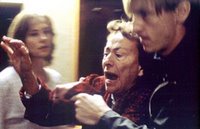 directly implicating us in the horrors that happen, Haneke just keeps opening up doors we really don't want to go through, showing us moments we don't want to see; moments that are too private and personal and embarrassing, and with his shots that are soooo long and so static, he dares us to look away, all ther while keeping us riveted with how far he will go.
directly implicating us in the horrors that happen, Haneke just keeps opening up doors we really don't want to go through, showing us moments we don't want to see; moments that are too private and personal and embarrassing, and with his shots that are soooo long and so static, he dares us to look away, all ther while keeping us riveted with how far he will go.
 A huge part of what makes the film work is Isabelle Huppert's performance, which I just couldn't take my eyes off of; she fills those long shots with a tidal wave of emotions running across her face, and even just her body language - there's a moment when she makes a(nother) horrible decision with her back to the camera, and I could read what was going through her mind by the twist of her neck and shoulder muscles. As she gets up and we follow her around, slowly figuring out together what exactly she's doing, we can't look away even though we want to scream no.
A huge part of what makes the film work is Isabelle Huppert's performance, which I just couldn't take my eyes off of; she fills those long shots with a tidal wave of emotions running across her face, and even just her body language - there's a moment when she makes a(nother) horrible decision with her back to the camera, and I could read what was going through her mind by the twist of her neck and shoulder muscles. As she gets up and we follow her around, slowly figuring out together what exactly she's doing, we can't look away even though we want to scream no.
I really have no qualms with placing Haneke's work in these three films alongside the best of Hitchcock. When Hitch talked about playing the audience like a piano, Michael Haneke listened. Next up he's doing a remake of Funny Games, and I find myself remembering that Hitchcock himself remade his own The Man Who Knew Too Much, to arguably better effect, and then I practically die from anticipation.
///
I liked Cache a lot. Enough to go back and watch Funny Games - which I hadn't seen in probably seven years and remembered finding somewhat unbearably brutal the first time - and, while it was a bit dated in its attempt to force the audience to accept their role in the onscreen violence by having the bad guys actually say so to the camera, everything else about it just knocked me for a loop. In a good way. That 13-minute shot where the camera just sits there watching the victims of a just-occured bit of horror react in real time? One of the most amazing I-cannot-take-my-eyes-off-the-screen moments ever.
His films are filled with long, static shots that are deliberately framed so we're not seeing exactly what we think we're seeing, or we're not seeing what we need to see, so we're forced to shift in our chairs, to look around the screen - to really interact with what's happening onscreen.
I read a letter Roger Ebert posted on his website the other day about Cache, and a theory that the videotapes the family receives are meant to have been sent by us, the audience, and that our actual voyuerism is what's wreaking havoc on their lives, and I was floored - of course that's what Haneke meant! It's the next, logical step after having the attackers in Funny Games actually accuse us, the audience, of being behind it all. Now the characters in the film aren't even allowed to have that voice, to know what's happening to them - our actions in just watching and wanting to see something dramatic and, inevitably, horrific, are so disruptive and so invasive that we simply fracture the storyline by looking at the screen.
The Piano Teacher is a different film than that, though, and takes another approach - instead of
 directly implicating us in the horrors that happen, Haneke just keeps opening up doors we really don't want to go through, showing us moments we don't want to see; moments that are too private and personal and embarrassing, and with his shots that are soooo long and so static, he dares us to look away, all ther while keeping us riveted with how far he will go.
directly implicating us in the horrors that happen, Haneke just keeps opening up doors we really don't want to go through, showing us moments we don't want to see; moments that are too private and personal and embarrassing, and with his shots that are soooo long and so static, he dares us to look away, all ther while keeping us riveted with how far he will go. A huge part of what makes the film work is Isabelle Huppert's performance, which I just couldn't take my eyes off of; she fills those long shots with a tidal wave of emotions running across her face, and even just her body language - there's a moment when she makes a(nother) horrible decision with her back to the camera, and I could read what was going through her mind by the twist of her neck and shoulder muscles. As she gets up and we follow her around, slowly figuring out together what exactly she's doing, we can't look away even though we want to scream no.
A huge part of what makes the film work is Isabelle Huppert's performance, which I just couldn't take my eyes off of; she fills those long shots with a tidal wave of emotions running across her face, and even just her body language - there's a moment when she makes a(nother) horrible decision with her back to the camera, and I could read what was going through her mind by the twist of her neck and shoulder muscles. As she gets up and we follow her around, slowly figuring out together what exactly she's doing, we can't look away even though we want to scream no.I really have no qualms with placing Haneke's work in these three films alongside the best of Hitchcock. When Hitch talked about playing the audience like a piano, Michael Haneke listened. Next up he's doing a remake of Funny Games, and I find myself remembering that Hitchcock himself remade his own The Man Who Knew Too Much, to arguably better effect, and then I practically die from anticipation.
///
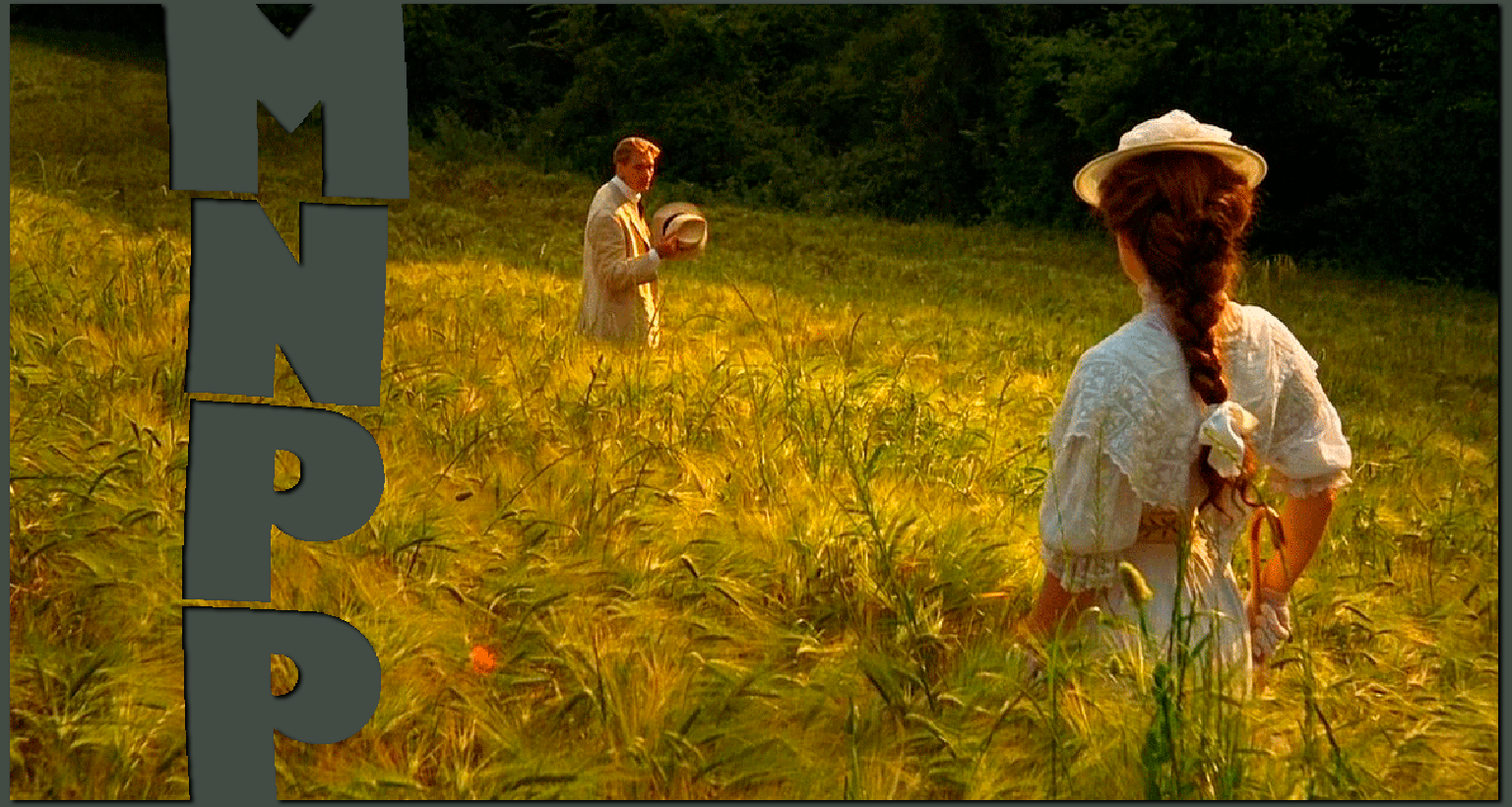

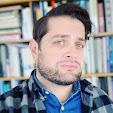



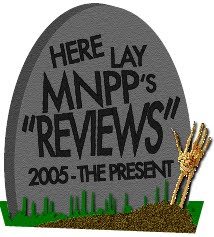



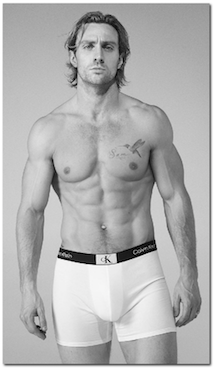


























2 comments:
Yea, The Piano Teacher is an amazing film and I read Roger Ebert's little piece about Caché a little while ago and remember beeing speechless afterwards. Maybe I should watch Caché again, because I wasn't as in love with when I saw it as I was with, say, The Piano Teacher. And Funny Games is right up there in my netflix queue.
The Piano Teacher changed my life. Like The Shining changed my life.
I am so glad you love him too. I would go as far as to say... occasionally... that Haneke is the new Kubrick minus the genre deconstruction. Nobody but those two can pull off that kind of command of pace.
YOU HAVE GREAT TASTE!
Post a Comment